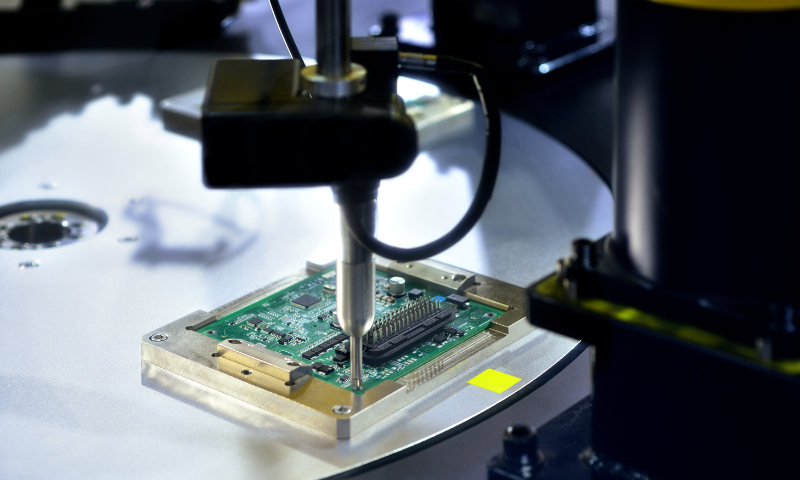
Production of semiconductor chip File photo: VCG
Chinese analysts on Tuesday criticized US Senate Majority Leader Chuck Schumer's proposal to ban the US government from conducting business with firms that use Chinese-made semiconductors, stressing the move only serves political goals and does nothing to benefit the global supply chain.
Schumer on Monday urged US lawmakers to support his proposal to bar the US government from doing business with firms that "use semiconductors made by producers the Pentagon considers Chinese military contractors," Reuters reported.
"If American business wants the federal government to buy their products or services, they shouldn't be using the kind of Chinese-made chips that, because of Chinese government involvement, put our national security at risk," Schumer said, according to Reuters.
Given that the US government has been constantly stepping up its crackdown on Chinese companies over semiconductors, such a hyped proposal is within expectations, analysts said, adding that it would only serve relevant US politicians' political goals, while hurting global supply chains.
"What the politician advocated is only to serve his political purpose, because, in fact, there are basically no China-made chips used in sensitive departments in the US government," Fu Liang, an independent tech analyst, told the Global Times on Tuesday.
"It's apparently a geopolitical game," Fu said, adding that the "proposal" is just another sign of how more US politicians are using the chip crackdown to reap political gains.
It is high time for the US government to recognize that its recent crackdowns on China's rapidly growing semiconductor industry will only disrupt the global semiconductor supply chain, and the restrictions and decoupling actions it takes will only hurt itself and others, Fu added.
Meanwhile, despite relentless efforts, the US has been unable to persuade its so-called allies, particularly Japan and the Netherlands, to sign a "near-term" deal to bring them on board with new US rules curbing China's access to sophisticated chipmaking tools, showing there is increasing pushback from global chipmakers in playing the geopolitical game with those politicians, observers said.
Dutch Foreign Trade Minister Liesje Schreinemacher told lawmakers on November 22 that the Netherlands will make its own decision regarding world-leading chip company ASML's chip gear sales to China amid trade rule talks with the US, Bloomberg reported, signaling that the European country will not cave in to US coercion despite the latter's stepped-up pressure.
In early October, the US government announced a broad set of technology export controls, including what is said to be the harshest ban on shipments of certain semiconductor chips made anywhere in the world with US equipment to China, intensifying the tech decoupling push.
In response, Mao Ning, a spokesperson for China's Foreign Ministry, said the US' politicization and weaponization of technology, economic and trade issues will not stop China's development, but will only hurt the US itself.
China's semiconductor industry is gradually developing its capacity, relying partly on other countries while expanding its own production, in face of the US' reckless threatening moves, and experts forecast it will see some breakthroughs within one or two years.
China has remained the world's largest semiconductor market, with sales totaling $192.5 billion in 2021, up 27.1 percent year-on-year, data from the China Semiconductor Industry Association showed.
Global Times



